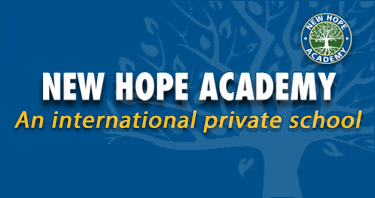


Statement on Faith, Devotions, and Traditions
It is increasingly difficult to raise good children in today's world, and we at New Hope Academy feel it is the job of the school to support parents in their efforts to help their children to build character and to be morally resilient. A complete education must address the whole person: body, mind, and spirit. New Hope is the result of people of various faiths working to support one another in this effort. Our families and teachers are from over 35 different religions and denominations and represent more than 25 nationalities. Although our backgrounds are diverse, we have in common a love of God and a set of shared values.
Our school is grounded in the belief that there is one God and that humanity is one family. We include God, and the basic values that are common to all the great religions, in all that we do. We strive to enlighten students to the beauty of how people express their faith rather than focus on a particular faith or doctrinal point of view. For example, teachers and students will take turns offering the morning prayer. In the process, students are exposed to different styles of prayer and a broad range of beliefs and styles of devotion.
Although New Hope Academy was founded in 1990 by members of the Unification faith, it is not a sectarian school. No doctrines are taught; in fact, no classes in religion are offered. We believe it is the job of parents, with the support of their church, temple, or mosque, to impart their personal faith to their children.
On the other hand, New Hope is far from being a secular school. We include God, prayer, religious morality, and all expressions of faith in our school life, and we believe that these are an important part of children's development.
In exploring the winter holidays, the children may learn about Christianity's celebration of the birthday of Jesus. They may experience the lighting of the menorah for the Jewish celebration of Hanukkah. They may learn that Unificationists offer their year to God by celebrating God's Day. The seven principles of Kwanzaa could be discussed or a Muslim teacher or parent may explain the significance of Ramadan to a class.
In general, however, emphasis is placed on the common values taught by all faiths: the Golden Rule, honoring parents, and basic virtues such as honesty, purity, kindness, and truth. The family is honored, as is marriage and the ideal of parenthood.
Each week, the daily morning messages are based on a particular theme that focuses on these common values, such as honesty, responsibility, perseverance, etc. Pre-school teachers use a brief portion of their "circle time" as their morning message time. The theme is translated into messages that are practical, relevant, and developmentally appropriate for each age group. The time is considered part of the character education curriculum and attendance is mandatory.
Parents have mentioned that their children occasionally share beliefs or practices that differ from their family's faith, or that sometimes younger students mimic the way their friends at school pray. We encourage parents to view this as an opportunity to share the deeper meaning of their personal faith and traditions with their children.
Staff and students who have special prayers, restrictions, or dietary needs related to the traditions of their faith should make these needs known to the administration or teachers. New Hope will do its best to honor the requests, such as time for prayer or breaking of fasts, or alternative art projects for students who are not allowed to observe certain holidays.
We recognize that our approach may not be for everyone. Some families may decide that they are not comfortable with their child being exposed to faiths different from their own. One's faith decisions are very personal and should be undertaken thoughtfully. Because New Hope Academy is a school where many faiths are honored, careful consideration should be given to this matter in choosing New Hope for your family.